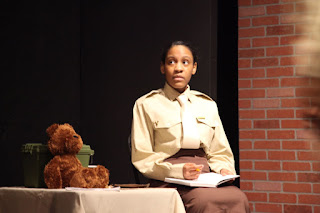How Did She Go From Bullied to Brand Executive?
 |
| Photo Courtesy of Amiya Steed--Steed's sneakers exhibit positive affirmations to help girls feel good about themselves. The shoes are the result of Steed being creative while standing up to bullies. |
By Maniko Barthelemy
Who are you
wearing? The question is directly asked and often associated with celebrities
being interviewed at red carpet events. The answer is important, since clothing
and shoes signify peculiar assertions about the designer and the customer.
That same
pressure and pressure exists when it comes to children. It’s a sad but serious
reality and begins as early as elementary. As students head back to school, the
question about their clothes or sometimes more importantly, their shoes, is not
asked as a compliment. Couple that with bullies preying on students, and you
have a situation that stresses a child and frustrates a parent. “Two boys kept
throwing pencils, saying rude things to me,” said 11-year-old Amiya Steed.
 |
| Photo Courtesy of Amiya Steed--Amiya Steed is an 11-year-old entrepreneur and emerging actress. In 2016, she launched AMAK by Amiya footwear. |
That experience
in the second grade for Amiya helped her hit back in a professional way and tap
into her creativity and the pre-teen retail market as a CEO of her own brand of
sneakers. “Why don’t I make shoes for kids just because of how they look and
how they act with words that say you’re beautiful, pretty smart?”
As a
third-grader, Amiya officially launched AMAK by Amiya footwear, her line of sneakers in 2016.
Instead of a logo, she uses language that states exactly the opposite of what
bullies spew. Self-expressive positive words like faith, wonderful, astounding,
assertive, boss, etc. cover her black or white lace-up, low-top sneakers.
Amiya tailors every
pair to her exclusive female client’s request. “My customers tell me the
design,” she said. “I share that with the manufacturer overseas.” The lace-up shoes
are comfortable walkers made with breathable cotton and have a soft rubber sole
accented by a solid stripe circling the base of the shoe.
 |
| Photo Courtesy of Amiya Steed-The low-top walkers with rubber soles are covered with complimentary words, some of which, clients request, when ordering the shoes Amiya designs. |
The tween’s
company independently markets and sells the sneakers but is plans to expand its
brand by sharing space one day with heavyweights like Nike, Reebok and Adidas.
Just as those multi-billion dollar industry giants deliver on the expectations
of shoe and fashion fanatics, Amiya knows her target audience well. She markets specifically to girls between 9
and 13 years old who are vying to stand-up to bullies and solidify their
identity through affordable fashion with a principle.
She does not
have to go far to find out what they want, since Amiya actually sees potential
customers daily. “I love shoes,” she
said. She proudly wears her shoes to school and some of her most loyal clients
are her friends.
To find out more
about AMAK by Amiya, visit www.AmiyaSteed.com . You can also follow her on
Instagram @AmiyaTheCelebKid.
Amiya’s story is one
of several weekly stories you’ll see here throughout the summer, as part of
“How Did She…?” The series will focus on women who are defying the odds in
various industries.
We value your
feedback and story suggestions. Feel free to contact us at NewsHeels@gmail.com.








